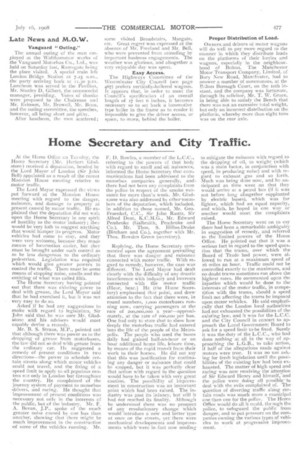Home Secretary and City Traffic.
Page 17

If you've noticed an error in this article please click here to report it so we can fix it.
At the Home Office en Tuesday, the Home Secretary (Mr. Herbert (lad
stone) received a deputation, headed by -the Lord Mayor of London (Sir John Bell) appointed as a result of the recent Mansion House meeting relative to motor traffic.
The Lord Mayor expressed the views put forward at the Mansion House meeting with regard to the danger, .nuisance, and damage to property at present caused by motor traffic. He explained that the deputation did not wait upon the Home Secretary in any spirit of hostility to the motor industry; they would be very loth to suggest anything, that would hamper its progress. Motor vehicles had come to stay-, and they were very welcome, because they made means of locomotion easier, but they must be brought under such control as to be less dangerous to the ordinary pedestrian. Legislation was required which would give greater powers to control the traffic. There must be some means of stopping noise, smells and the emitting of what was called filth.
The Home Secretary haying pointed out that there was existing power to deal with grease, the Lord Mayor said that he had exercised it, but it was not arery easy to do so.
Asked if he had any suggestions to make with regard to legislation, Sir John said that he was sure Mr. Glad..tone and his advisers would most capably devise a remedy.
Mr. B. S. Straus, M.P., pointed out that although there was power as to the elropping of grease from motorbuses, thelaw did not so deal with grease from the ordinary car. He suggested a remedy of present conditions in two directions—the power to schedule certain streets along which motor vehicles could not travel; and the fixing of a speed limit to apply to all populous centres not only in London but throughout the country. He complained of the journey system. of Payment to motorbus Replying, the Home Secretary commented upon the agreement prevailing that there was danger and nuisance connected with motor traffic. With regard to remedy, however, the case was different. The Lord Mayor had dealt clearly with the difficulty of any drastic interference with industry and interests connected with the motor traffic (Hear, hear.) He (the Home Secretary) emphasised that point, and drew attention to the fact that there were, in round numbers, i,000 motorbuses running now, carrying passengers at the rate of 200,000,000 a year—approximately, at the rate of 200,000 per bus. One had only to state that to show how deeply the motorbus traffic had entered into the life of the people of the Metropolis. The people who used the buses daily had gained half-an-hour or an hour additional home life, leisure time, by means of the rapid transit from their work to their homes. He did not say that this was justification for continuing any danger or nuisance that could be stopped, but it was perfectly clear that action with regard to the question would have to be taken with very great caution. The possibility of improvement in construction was an imnortant point vs.hich had been raised. The industry was past its infancy, but still it had not reached. its finality. Although he understood there was no -prospect of any reyolutionarv change 'Which wouldintroduce a• new and better .'type at once on the streets, yet: there were mechanical developments and improvements which were in .fact now tending to mitigate the nuisance with regard to the dropping of oil, to weight (which was a main factor, in conjunction with speed, in producing noise) and with regard to exhaust gas and so forth. Much was being done now, and he anticipated as time went on that they would arrive at a petrol bus (if it was not before long altogether supplanted by electric buses), which was far lighter, which had an equal capacity, and which, he hoped in one way or another would meet the complaints raised. The Home Secretary went on to say there had been a remarkable ambiguity in suggestion of remedy, and referred to the limited powers of the Home Office. He pointed out that it was a serious fact in regard to the speed question that the trains, over which the Board Of Trade had power, were allowed to run at a maximum speed of 16 miles an hour. Traffic could not be controlled exactly to the maximum, and no doubt trams sometimes ran above the highest rates. He commented upon the injustice which would he done to the interests of the motor traffic, in competition with the trams, should a speed limit not affecting the trams be imposed upon motor vehicles. He said emphatically that the London local authorities had not exhausted the possibilites of the existing law, and it was for the L.C.C. and the City Council in concert to approach the Local Government Board to ask for a speed limit to be fixed. Surely it was the duty of the L.C.C., who had done nothing at all in the way of approaching the L.G.B., to take action, if half of the allegations made against motors were true. It was no use asking for fresh legislation until the, pOssibilities of the existing law had been exhausted. The matter of high speed and racing was now receiving the attention of Sir Edward Henry and himsel_L-and the police were doing all possible' to deal with the evils complained of. 'The question of diverting traffic along certain roads was much more a municipal one than one for the police.. The Horne Office. would do all it .could, through the police, to -safeguard the public from danger, and to put pressure on the companies owning the various types of vehicles to work at progressive improvemeat. •
























